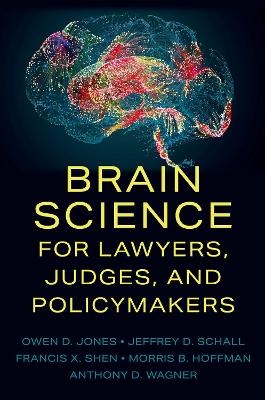
Brain Science for Lawyers, Judges, and Policymakers
Oxford University Press Inc (Verlag)
978-0-19-774886-2 (ISBN)
Brain science in the form of neuroscientific evidence now appears frequently in courtrooms and policy discussions alike. Many legal issues are at stake, such as how to separate the best uses of brain science information from those that are potentially biasing or misleading. It is crucial to evaluate brain science evidence in light of relevant legal standards (such as the Daubert and Frye Rules).
Brain Science for Lawyers, Judges, and Policymakers responds to this rapidly changing legal landscape, providing a user-friendly introduction to the fundamentals of neuroscience for lawyers, advocates, judges, legal academics, and policymakers. It features detailed but clear illustrations, as well as a comprehensive and accessible overview of developments in legally relevant neuroscience. Readers will learn brain science terms, how to understand and discuss brain structure and function in legally relevant contexts, and how to avoid over- or under-interpreting neuroscientific evidence.
The book begins with a survey of the kinds of litigation, legislation, and regulation where neuroscience is currently being used. It provides accessible descriptions of basic brain anatomy and brain function as well as an overview of how modern technologies can reveal the brain structures and brain functions of individuals. It finishes with cautions and limitations, including timely and thought-provoking observations about where the future of neurolaw might lead. Throughout, the authors offer clear and concise guidance on understanding both the promise and the limitations of using brain science in law and policymaking.
Owen D. Jones holds the Weaver Chair in Law, Brain, and Behavior at Vanderbilt University, where he is both Professor of Law and Professor of Biological Sciences. Professor Jones previously served as Co-Director and then Director of the MacArthur Foundation Law and Neuroscience Project. He currently directs the Weaver Family Program in Law, Brain Sciences, and Behavior. He is also an elected Fellow of the American Association for the Advancement of Science (AAAS). Jeffrey D. Schall obtained a Ph.D. at the University of Utah and postdoctoral training at the Massachusetts Institute of Technology before joining the faculty at Vanderbilt University in 1989 and moving to York University in 2021. Professor Schall is a fellow of the Association of Psychological Science and of AAAS; he participated in the MacArthur Law and Neuroscience Project and contributed to the first coursebook in Law & Neuroscience. Francis X. Shen, JD, PhD is an Associate Professor at the Center for Bioethics at Harvard Medical and the Department of Psychiatry at Mass General Hospital, and a Harvard University Affiliated Professor at Harvard Law School. Dr. Shen has co-authored 3 books, is a Principal Investigator on multiple NIH BRAIN Initiative grants, and leads the Dana Foundation Career Network in Neuroscience and Society. Morris B. Hoffman was a district judge in the Second Judicial District, State of Colorado, from 1991 to 2021. He was chair of the Colorado Supreme Court's Panel on Multidistrict Litigation, and a member of the Colorado Supreme Court's Advisory Committee on the Rules of Criminal Procedure. Morris B. Hoffman is a member of the John D. and Catherine T. MacArthur Foundation's Research Network on Law and Neuroscience, and a research fellow at the Gruter Institute for Law and Behavioral Research. Anthony D. Wagner is a Lucie Stern Professor in the Department of Psychology and a deputy director of the Wu Tsai Neurosciences Institute at Stanford University. Professor Wagner is a Reviewing Editor at Cerebral Cortex and Cerebral Cortex Communications, and an elected Fellow of the American Association for the Advancement of Science (AAAS), Association for Psychological Science, and Society of Experimental Psychologists.
Foreword
Chapter 1: Where We Are Now
Chapter 2: Overview of the Brain
Chapter 3: The Cerebral Cortex
Chapter 4: The Interior of the Brain
Chapter 5: How Neurons Work
Chapter 6: Technologies that Reveal Brain Structures
Chapter 7: Technologies that Reveal Brain Functions
Chapter 8: Changing Brain Functions
Chapter 9: Limitations and Cautions
Chapter 10: Where We Might Be Headed
Afterword
Further Readings and Resources
Glossary
| Erscheinungsdatum | 12.03.2024 |
|---|---|
| Zusatzinfo | 21 |
| Verlagsort | New York |
| Sprache | englisch |
| Maße | 147 x 226 mm |
| Gewicht | 227 g |
| Themenwelt | Naturwissenschaften ► Biologie ► Humanbiologie |
| Naturwissenschaften ► Biologie ► Zoologie | |
| Recht / Steuern ► Allgemeines / Lexika | |
| Recht / Steuern ► EU / Internationales Recht | |
| ISBN-10 | 0-19-774886-4 / 0197748864 |
| ISBN-13 | 978-0-19-774886-2 / 9780197748862 |
| Zustand | Neuware |
| Informationen gemäß Produktsicherheitsverordnung (GPSR) | |
| Haben Sie eine Frage zum Produkt? |
aus dem Bereich


